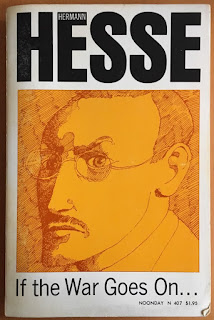It's the third week of Nonfiction November and the prompt from JulzReads (thanks for hosting!) challenges us to be or become or ask an expert on a topic of interest.
Well, I'm pretty much incapable of thinking that I could be an expert on anything, but maybe I could become one? By asking? Seems like expertise is always a process of becoming.
Anywho, I've been curious about the opening of World War I. The centennial of that event wasn't so long ago, and there have been a number of books on the subject in the last couple of years. There was considerable enthusiasm at the start of the war, and if the so-called 'August Madness', the moment where everyone wanted war, is sometimes overstated, it was a significant phenomenon. How could anybody have wanted it? To us now, it seems like such a bad idea. But even odd, intellectual ducks, like Hesse, Wittgenstein, Kafka (thanks @magistrabeck!) were desperate to go fight.
Mass enthusiasm for bad ideas in public policy is just a thing that worries me these days. I don't know why...
But some intellectuals and thought leaders resisted the enthusiasm, or at least wanted the war to be prosecuted without demonizing the enemy. Romain Rolland, Lytton Strachey, George Bernard Shaw, Hermann Hesse (after a little bit).
Some books on the topic:
Hermann Hesse's If The War Goes On...
Romain Rolland's Above The Battle (Project Gutenberg has it here)
George Bernard Shaw's Common Sense About The War (here)
Michael Holroyd's Lytton Strachey: The New Biography. The Other Reader gave me this after we saw the movie years ago.
I also really liked the Teaching Company course on WWI. The August Madness lecture early on addresses these issues.
And another way to resist the militarism of the war...
Any other books on the resistance to World War I in the early days? Let me know!




It's not so much a resistence to the war, more of a clear, concise view of the war as it happened and it's impact on those left at home, Vera Brittain's bio Testament of Youth is heartbreakingly good.
ReplyDeleteI've heard of that, but never read it. Thanks for the tip--I'll have to check it out.
DeleteFallen between the cracks...but this was a very important book when it was written:
ReplyDeleteRomain Rolland
Above the Battle (Au-dessus de la mêlée) (1915)
If you are reading 'The Nobels'...Rolland won the prize in 1915!
Interesting topic and books...thanks for sharing your expertise!
A bit this all came from reading Rolland's Jean-Christophe for the Classics Club. I think he's a undeservedly neglected Nobel prize winner.
Deletenice perspective!
ReplyDeleteMy post is here: https://wordsandpeace.com/2018/11/14/nonfiction-november-2018-expert-on-books-on-books/
Thanks!
DeleteYou may have seen this already, but Margaret at booksplease.org is looking for books on pretty much the same topic, so she might be getting some additional recommendations :)
ReplyDeleteThanks for the tip! I'll check out her site.
Delete